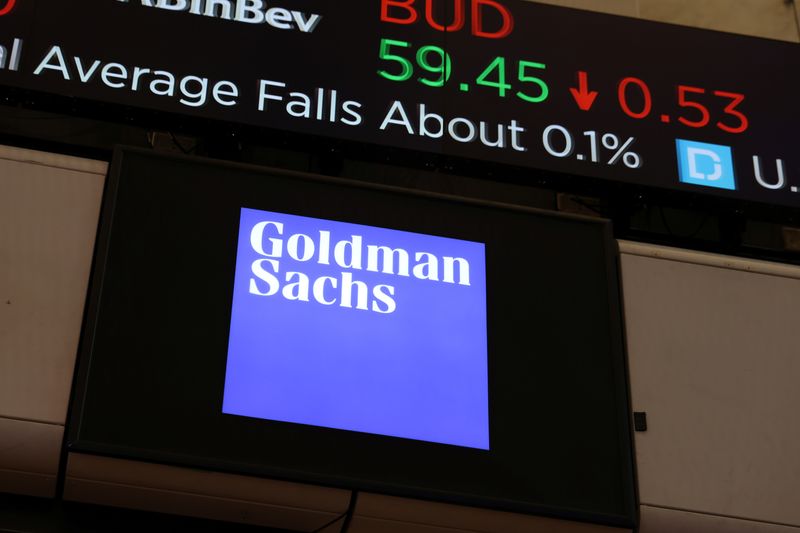Factbox-U.S. banks increase reserves for commercial real estate exposure
2023.07.21 17:08
3/3

© Reuters. The logo for Goldman Sachs is seen on the trading floor at the New York Stock Exchange (NYSE) in New York City, New York, U.S., November 17, 2021. REUTERS/Andrew Kelly/File photo
2/3
By Matt Tracy
(Reuters) – The U.S. commercial property market has faced severe challenges since the pandemic due to lingering office vacancies, diminished retail activity and higher interest rates. That stress has caused banks and other lenders to tighten their standards for new loans and scrutinize existing ones.
While regional banks carry the greatest exposure to the commercial real estate (CRE) sector, second quarter earnings show that a number of big banks have prepared for potential defaults, primarily on office loans.
Here are the highlights across the sector:
BANK OF AMERICA CORP:
Chief Financial Officer Alastair Borthwick said the bank had $17 million in charge-offs, or debt owed to a bank that is unlikely to be recovered, on its office loan exposure during the second quarter versus $15 million in the first quarter. The value of assets under review for credit risk rose by $1.7 billion from the first quarter, due mainly to its CRE exposure. However, Borthwick noted the bank’s office CRE exposure was low relative to its overall loan portfolio, at 2%.
GOLDMAN SACHS GROUP INC
The investment bank reported about $305 million in net losses within a private portfolio, driven by markdowns on office CRE, it said. The Wall Street giant also said its debt investment revenue of $197 million had declined year-on-year due primarily to “weaker performance” in its real estate investments.
Goldman Sachs Group (NYSE:) CFO Denis Coleman said the bank’s provision for credit losses stood at $615 million in the second quarter. CRE loans represented just 15% of the bank’s overall lending book, while only 1% of the CRE loan portfolio was office-related.
JPMORGAN CHASE & CO
While its CRE revenue grew to $806 million in the second quarter from $642 million in the first, JPMorgan (NYSE:) reported $1.1 billion in credit loss provisions driven by its office portfolio. While the portfolio was “quite small”, Chief Financial Officer Jeremy Barnum told investors the bank increased provisions “to what felt like a comfortable coverage ratio.”
WELLS FARGO
The bank said it had a $949 million increase in its allowance for credit losses, primarily CRE office loans.
At the same time, it saw a quarter-on-quarter rise in CRE revenue as a result of higher interest rates and loan balances.
“While we haven’t seen significant losses in our office portfolio to-date, we are reserving for the weakness that we expect to play out,” CEO Charlie Scharf said.
CITIZENS FINANCIAL SERVICES
Citizens’ nonaccrual loans – those on which a payment hasn’t been made for 90 days – grew by $195 million to roughly $1.2 billion, while its net charge-offs increased by $19 million to $152 million. Both increases were driven largely by the bank’s CRE holdings.
Citizens recorded a credit loss provision of $176 million in the second quarter. It increased its allowance for credit losses to $2.04 billion from $2.01 billion at the end of the first quarter, which included $41 million in connection with its general office portfolio.
“We believe losses are manageable and readily absorbed by reserves,” Bruce Van Saun, Citizen’s CEO, told investors.
EAST WEST BANCORP
The bank highlighted that its CRE portfolio had a low average loan-to-value (LTV) ratio of 61%, a key metric used to determine the credit risk of a loan. East West’s office portfolio had a weighted average LTV of 52%.
While almost three-quarters of the bank’s office loans are to borrowers in the troubled California market, it noted a “high percentage” of its CRE loans carry full recourse and personal guarantees from individuals with “substantial net worth.”
“All of these characteristics help to keep this portfolio strong,” Dominic Ng, East West’s chairman and CEO, said.
FIFTH THIRD BANCORP
The regional bank’s allowance for credit losses increased 0.09% from the first quarter to $2.53 billion, due in part to a 0.27% increased allowance for its commercial mortgage loans.
Fifth Third’s nonperforming CRE loans declined to 0.13% in the second quarter from 0.29% in the first quarter. Its percentage of CRE loans at least 30 days delinquent grew to 0.29% from 0.04%.
“We have limited office exposure,” Fifth Third CFO James Leonard told investors Thursday, noting the bank “had deemphasized office even before the pandemic.”
MORGAN STANLEY
The investment bank said provisions for credit losses in the second quarter amounted to $97 million versus $82 million the same period last year, primarily driven by deterioration in CRE.
WEBSTER FINANCIAL CORP
The regional bank’s nonperforming CRE loans ticked up to $47.9 million last quarter from $35.8 million in the first quarter.
Meanwhile, it divested $80 million in CRE loans last quarter, “the vast majority of which were secured by office properties,” resulting in $13 million in charge-offs, Webster CFO Glenn MacInnes told investors. The bank reduced its office exposure by 25% over the last four quarters with a “minimal hit to capital,” CEO John Ciulla said.








